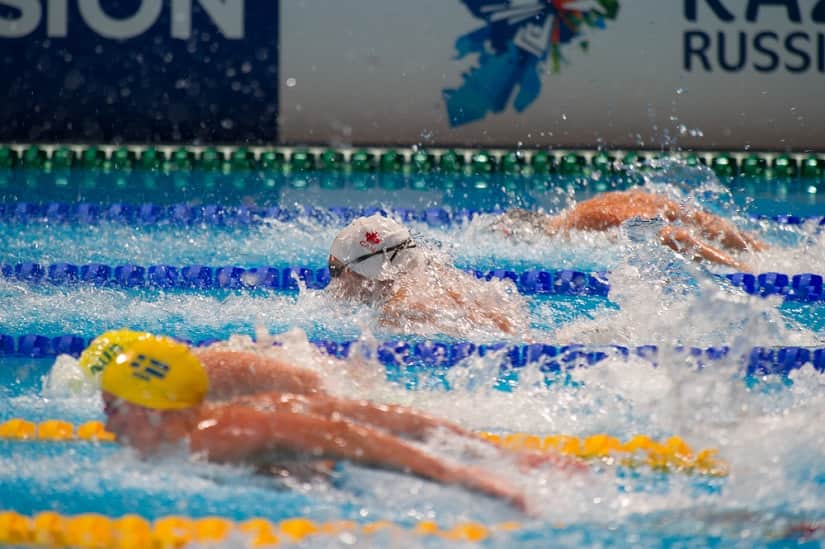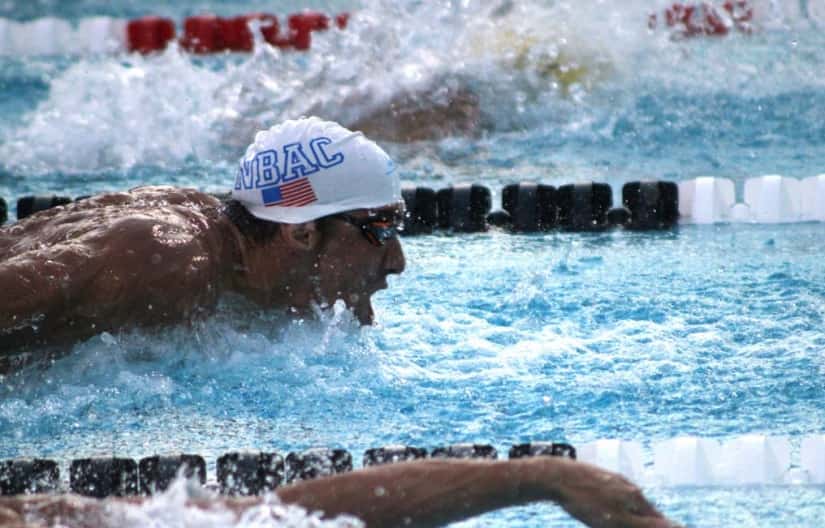Fast swimmers dominate their performance, inside and out. Here’s what I mean by that and why you should embrace an outlook of dominating your swimming.
If you stopped and thought about the mental approach you take with your swimming, what word would you use?
Interested?
Committed?
How about dominant?
Why You Should Strive to Be Dominant Today (and Tomorrow, and the Day After That, Too)
Champion swimmers take an attitude of dominance wherever they go. It’s not just the medals they win, how they decimate the competition… and it’s not even necessarily about their ability to win.
In this instance, when I mean that elite swimmers are dominant, it’s in how they approach their performance and everything that it contains.
It’s about dominating your own performance to the best of your ability—which has a funny way of heavily influencing the results into going your way on race day.
It’s an attitude that you will dominate everything big and small in your training.
The biggies are obvious:
- The mindset you take with you behind the block to dominate your race plan, and by extension, your personal best times.
- The attitude you have in practice: are you the swimmer that is going to walk on the pool deck and react to the sets and workouts at hand, or are you proactively going to get after them, choosing to make the training work for you?
- A willingness to dream big, but to act bigger by dominating the seemingly meaningless and countless small steps along the way.
(And no, being dominant doesn’t mean you have to be the alpha in the pool, pounding your chest and possessing all the swagger. Being dominant means being the best version of you.)
Dominance is found in the details that most swimmers will overlook while obsessing about why they can’t get motivated or “feel like” working hard:
- The dominant swimmer focuses relentlessly on improving their stroke technique, knowing that while gains in conditioning and strength are critical, just as important is being able to swim further and faster more efficiently.
- The dominant swimmer views their ideal performance in the context of a whole race, and that means drilling and refining the aspects between the flags: the start, the breakout, the underwaters, attacking the walls, and so on.
- The dominant swimmer also knows that the life they lead outside the pool has a huge influence on how they perform inside of it.
The dominant swimmer uses this attitude of performing at a high level everywhere they go.
Dominating Includes Recovery
When we go all-in on our goals, the tendency is to go all-go, no-quit: every last ounce of energy is devoted to training our butts off until we are left a soggy, crumpled mess (kinda like that wet towel that’s been sitting on your bathroom floor for the last week). We focus on getting the most from ourselves in the water, whether it’s increasing our focus on improving technique, challenging ourselves to try new intervals, or simply not give up during the main sets.
Working hard and committing to excellence in practice is critical. There’s no arguing that.
But the elite swimmer understands something that seems too easy or simple for many–a dominating performance means also dominating your recovery. These two parts of your swimming are not separate: the time and effort you spend on your recovery plays a huge role in how things go in practice.
So what does dominating your recovery look like?
It’s managing stress outside of the pool. It’s managing your time and schoolwork so that you don’t collapse under the weight of studying and assignments. It’s getting to bed early so that your body has a chance to recuperate after the day’s thrashing at the pool. It’s making better food choices so that you have more consistent levels of energy between and during swim practices.
Dominate your stress management. Your sleep. And your nutrition.
Unleash Some Free-Range Dominance
Being dominant is also not about subjecting your will on others. It’s not even about beating the swimmer in the next lane…
Again: it’s about showing up and dominating your preparation.
Focusing on what you control.
Doing your very best with what you have.
And make no mistake…
This kind of relentless approach is tough.
To be elite and dominant isn’t a part-time job; it’s not something you turn on and off at your convenience.
But ya wanna take a guess at what happens when you dominate your training, when you dominate your effort, and when you dominate your mindset behind the blocks?
Well, I’m sure you can imagine.
More Stuff Like This:
This New Mental Training Workbook Will Help You Swim Like a Rock Star This Season. Confused about mental training? Want to unleash pro mode on your swimming this year? Learn how this new mental training workbook will change your mindset and help you pummel your PB’s this season.
Why Change is So Hard in the Pool (and How to Make It Easier). We all want change in some measure—so why is it so dang difficult to make happen? Here’s the reality behind making change that actually sticks in the pool.
17 Things That Mental Training Will Do for Your Swimming. Not entirely sure what mental training can do for you? Here’s just a sampling of the superpowers it gives you in the water.
















